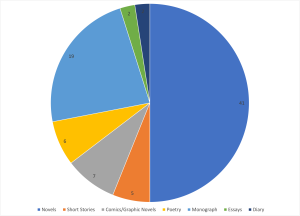A better literary culture would be one that’s not so dependent on personal esteem and mutual reinforcement. It would not treat offense or disagreement as toxic. We wouldn’t want so badly to be liked above all. We’d tolerate barbed reviews, some quarrels, and blistering critiques, because they make our culture more interesting and because they are often more sincere reflections of our passions. If we all think more and enthuse less, when I do truly love Laura Lamont’s Life in Pictures, you’ll be more likely to believe me.
But what seems to stick in my mind is praise from the wrong people. Obviously this is incredibly elitist and snobbish, but then that’s my prerogative as a novelist. The people who wrote four-star Amazon reviews were almost more annoying than the one- or two-star reviews, because of the way they looked at the book… I wanted to take all the caveats they had and really emphasise those things, to slough off as many of them as possible.
One of the weird things about publishing these days is that there is an enormous appetite for snuggling into the interior world of the writer—through readings, interviews, Twitter, creative writing programs, essays like this one—almost as if the book itself is not the point of it all but rather an inconvenient membrane dividing the writer from her public; and yet there is still no appetite whatsoever for considering some of the less congenial truths of the writerly experience: That praise can be more dispiriting than criticism. That we don’t necessarily respect every single one of our readers. That sometimes we write to repel as much as we write to attract. Occasionally, in interviews, you can hear these attitudes humming in the background, but they’re not often admitted, even though to deny them is to deny that writers are human beings with human psychologies.
The single biggest surprise to me as a debut author gaining an audience for the first time was the extent to which people insist they can’t enjoy a novel without any likeable characters. (Which rules out Lolita, Heart of Darkness, The Trial, Animal Farm, The Stranger, Rabbit, Run, A Clockwork Orange, The Postman Always Rings Twice, Jealousy, A Good Man is Hard to Find, Last Exit to Brooklyn and much of the rest of the twentieth-century canon.) This is a useful example, because when someone demands likeable characters—I know I’m generalizing scandalously here—that’s often representative of a broader inhospitality to a lot of the things I prize in fiction: confrontation, ambivalence, paradox, subversion, total moral candor. And a great Amazon review from someone with literary values that you suspect to be utterly incompatible with your own can mean two things. It can mean you have written a book of such resplendent universal appeal that it converts even your adversaries. I don’t think that’s very likely in my case, otherwise my sales would be a lot higher…Or it can mean that you’ve been pandering—producing work that you don’t honestly believe in, just because you want to caper before a mass audience.
In other words, when I talk about sloughing off certain readers, it’s not that I have anything against those people, or that I’m too good for their money, or that I don’t want them to enjoy their reading at the end of a long day. It’s because if I can write a book that those people don’t particularly care for, that will be an indication—not a proof, but at least an indication—that I’ve finally produced an uncompromised expression of the values to which I aspire as a writer.


